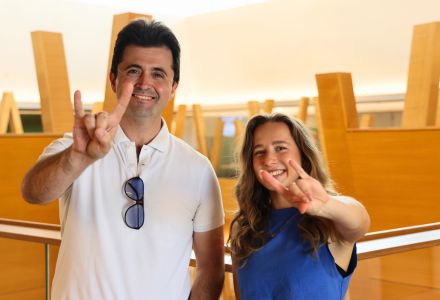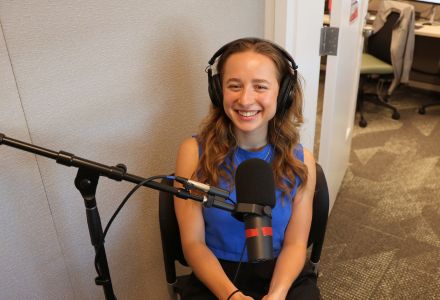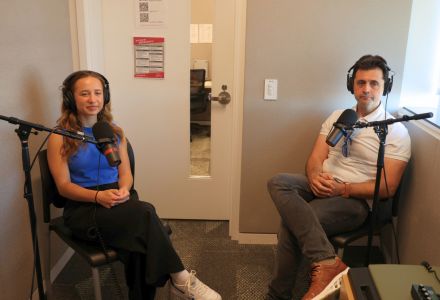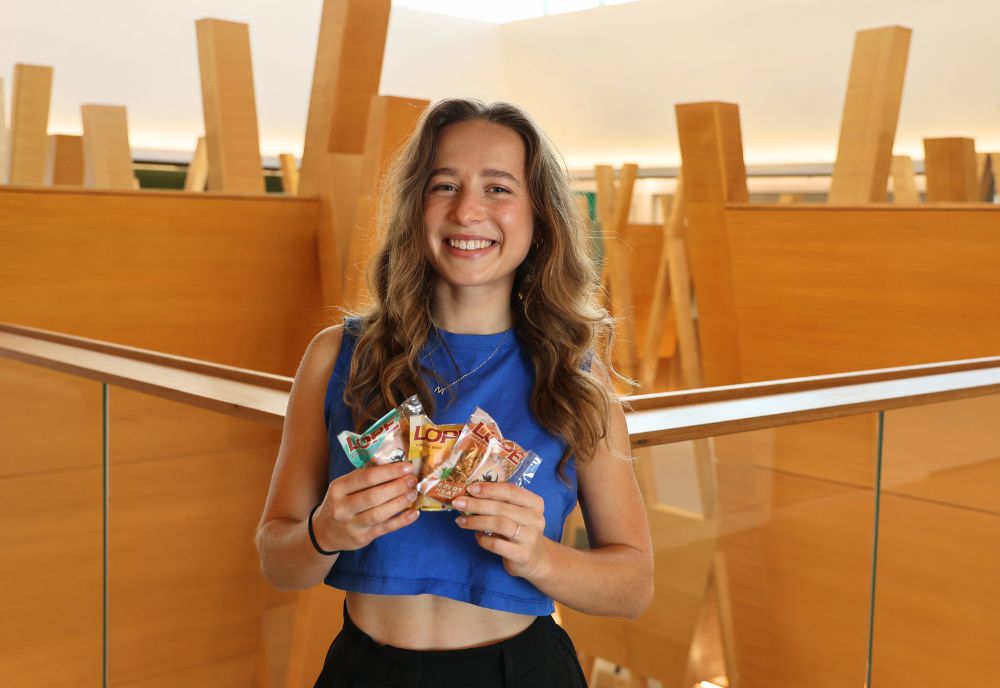While many aspiring entrepreneurs wait until after graduation to pursue their business ideas, student entrepreneurship at the University of South Florida (USF) knows no bounds. Through experiences in the Judy Genshaft Honors College and the Muma College of Business’ Nault Center for Entrepreneurship, students with entrepreneurial vision receive mentorship, gain access to funding opportunities and are exposed to meaningful networking experiences to bring their ideas to life.
Mira Stimac, an Honors student who transitioned from a computer science major to an entrepreneurship major in the Muma College of Business, had an idea to disrupt the athletic shoe market. As a competitive track and field athlete, Stimac had first-hand experience with the hassle of buying specialized shoes for different surfaces and activities. She pitched the idea of a modular training shoe that could adapt to various uses — and the USF HUSTLE program backed it.

Although the concept received initial support, market research revealed limited demand
for the product. Stimac pivoted.
She began interviewing runners to identify other challenges they faced during training.
One common complaint: the overwhelming sweetness of most energy bars. Athletes were
looking for an alternative that delivered fuel without the sugar overload.
From that need, Lope Bars was born — a savory energy bar brand using clean ingredients, designed specifically for athletes.
“These bars currently don’t exist on the market,” Stimac said. “I thought it would
be a perfect solution to the issues runners were facing before training.”
Using natural ingredients like brown rice puffs, honey as a bonding agent, and adaptogens
like maca and ashwagandha, Lope Bars is gaining fans as a savory alternative to most
energy bars currently on the market.
Stimac’s venture has taken her far: she has pitched her brand at TIE Tampa Bay, traveled to Google’s headquarters and competed in Silicon Valley, and took part in USF’s HUSTLE Incubator Program, earning seed-funding to launch her business. Her company, Lope Collective, now serves athletes and active individuals across Florida and is expanding its reach through social media.
Pivoting is Powerful

A key to Stimac’s success has been her ability to pivot and adapt.
Frank Nunez, program planner at the Nault Center and one of Stimac’s mentors, said pivoting is a critical part of entrepreneurship.
“Mira’s ability to pivot the way she did is a massive testament to her potential as an entrepreneur,” Nunez said. “For many entrepreneurs, pivoting is difficult because we fall in love with our original idea.”
Along with pivots come inevitable challenges — like unexpected costs and time constraints.
“When I first got the funding, I was so excited thinking, ‘What am I going to do next?’” Stimac said. “But then I learned that building a business costs much more money and takes more time than I ever thought it would.”
Balancing business operations with the demands of being a full-time student is no easy feat. Stimac spends about five hours a day managing Lope Collective. She relies on tools like Google Calendar and a detailed planner to stay organized.
She credits her experience as an athlete as a driver for her self-motivation and discipline.
“Being on the cross-country and track team taught me great time management skills,” she said. “It showed me that I just have to dig into what I need to do and move on to the next thing.”
Purpose-Driven Entrepreneurship

Initially unsure whether her entrepreneurial goals would align with the reflective nature of Honors coursework, Stimac said the two have worked hand in hand.
“All the Honors classes I’ve taken have directed me toward entrepreneurship,” she said. “When I studied abroad in London with the Honors College, we took a class that encouraged us to think, ‘Why am I doing what I’m doing, and how is it setting me up for the future?’”
Stimac said the reflective component of Honors courses helps her assess not only her identity as an entrepreneur but also her impact on the world.
“Reflection is a good thing — but a hard thing,” she said. “It helps me analyze what I’m doing and how I can improve my process to better align with my goals.”
Stimac and Nunez encourage students interested in entrepreneurship to take full advantage of USF’s resources and to build strong relationships with mentors.
“I meet a lot of very successful entrepreneurs, and the common thing among them is they had a mentor,” Nunez said. “Going above and beyond your degree and finding someone who can guide you will increase your chances of success.”
Stimac found that being adaptable is one of the best qualities an aspiring entrepreneur can possess.
“If you’re going to create a product, know it’s OK to let go of certain elements you think are essential,” she said. “At one point, I thought ingredients like mushrooms were essential to my product — but that wasn’t the case. You have to look at the full picture and ask, ‘What does the user need, and how can I fulfill that need?’"
Students can learn more about entrepreneurial opportunities at USF by visiting the Nault Center for Entrepreneurship website.
